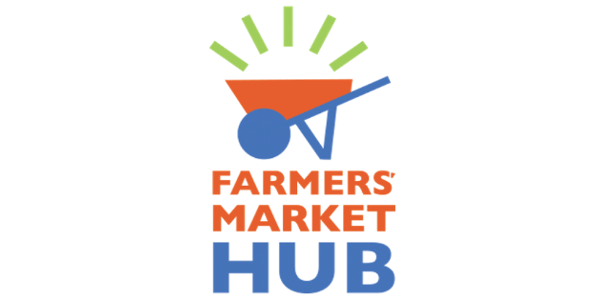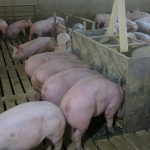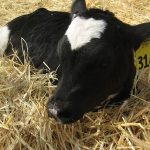Farmers’ Market Hub offers online ordering of Minn. growers’ products
MINNEAPOLIS — Farmers’ Markets across Minnesota are overflowing with the bounty of late summer, and while many people are shopping at these outdoor markets, that isn’t an option for everyone. With the onset of Covid-19, many loyal customers had to stop their weekly visits to the farmers’ market, so many markets across the state added a no-contact option. Seven of these markets are part of the Farmers’ Market Hub pilot project, launched in 2018 by Renewing the Countryside, the Minnesota Institute for Sustainable Agriculture and the Minnesota Farmers’ Market Association as a way for wholesale buyers (schools, restaurants, hospitals, etc.) to access more farm fresh products for their menus and lunch trays. But use of the program was slow to catch on partly because farmers didn’t have a lot of incentive to put their products online. That changed with Covid-19.
Online Ordering – Farmers’ Market Hubs
The Farmers’ Market Hubs – in Rochester, Grand Rapids, Aitkin, Wabasha, Red Wing, Richfield, and Cook – let patrons peruse a digital catalog and order from a wide array of fruits and vegetables, meats and dairy products, bakery items, honey, flowers, and other farm products, then pick up their order curbside on market day. This month and through October, shoppers will find apples, pumpkins, squash, carrots, mums, honey, maple syrup, potatoes, beets, microgreens, jams, bread, and much more. One customer shared, “Thank you so much for the online ordering and pick-up at the farmers’ market option. Just because the state is ‘opening up’ does not mean that it is safe for everyone, including me. I have a chronic health condition and I also have contact with my 90-year-old mother.”
The Rochester Farmers’ Market was the first to pivot to online sales. Because they had an online platform in place and the appropriate license, they were able to adapt quickly to meet both the needs of their customers and farmers. In their first week online, they had nearly 120 orders and over $5,000 in sales. Rochester has a population of over 120,000 people which has surely contributed to the success of the online shopping option, yet the Grand Rapids Farmers’ Market, with a community of just under 11,000 residents, has also seen success.
Innovative Selling Programs – Market Share Boxes
In addition to digital shopping, the markets are increasing sales in other innovative ways. In May, Kara Fletcher, the Hub manager in Grand Rapids, launched market share boxes—a weekly aggregation of produce from multiple farms. The initial goal was to sell at least six boxes for a 12-week distribution. The first six sold so quickly that she added more, ultimately selling 30 boxes per week from the end of June through mid-September. Market share boxes start at $25 per week and are also available at the farmers’ markets in Wabasha, Rochester, Richfield and Aitkin. The market share boxes have been especially beneficial to vendors who are not setting up their booths in the market this year because of health concerns of their own, while other vendors appreciate the security of knowing they already have a sale before they ever show up at the market.
Farmers’ Market Hub Impact on Farmers and Communities
Across the seven Hub farmers’ markets, total online sales are over $250,000 so far this year. More than 130 farmers are selling through these online markets, and over 1,000 customers have purchased through the online option, with many of them buying several times each month. These are significant sales for farmers. One farmer said, “We love this option so much. It has allowed us to extend our customer base by reaching people who feel safer with the no contact option and those customers with mobility issues. The platform has about doubled our market income for this market.” Another farmer, who started selling right away in Rochester when it shifted to online sales noted that he wouldn’t have been able to stay in business without those sales.
Potential to Increase
While sales through the online markets have been down some in the summer, Jan Joannides, Executive Director at Renewing the Countryside, expects to see a rise this fall and winter. “Going to the market in the summer is not just a shopping trip, it is a fun outing,” she said. “Customers love walking around and seeing the beautiful produce and visiting with the farmers (albeit masked and socially distanced). But when the weather gets cold, we anticipate many customers will opt to order online rather than shopping indoors.”
While some farmers’ markets will move indoors this winter, and some opt for outdoor shopping, those shopping through the Farmers’ Market Hubs can order online and stay in the warmth of their car. Many are surprised at how many products are available at markets through the late fall and winter – from carrots and beets and potatoes, to Thanksgiving Turkeys and pumpkin pies.
Resources Necessary to Ensure Success of Farmers’ Market Hub and Online Ordering
Building and sustaining programs such as the Farmers’ Market Hub require significant time and financial investments. The fast pivot to retail sales at participating markets was possible because the infrastructure (online system, licenses, equipment, supplies, and trained Hub managers) were already in place and operating with sales to wholesale buyers. Starting the Hub was made possible with a USDA Specialty Crop Block Grant, administered by the Minnesota Department of Agriculture, and support from Compeer Financial and the Minnesota Department of Health’s Statewide Health Improvement Program. Renewing the Countryside, Minnesota Farmers’ Market Association and the Minnesota Institute for Sustainable Agriculture manage the project and have been working behind the scenes with these markets to develop, grow, and evaluate this model.
“Innovative programs like this take investment to build the model and knowledge to implement it,” said Jane Jewett, Associate Director at the Minnesota Institute for Sustainable Agriculture. “Even after they are up and running, we anticipate that markets will need some outside investment to sustain the program.” While participating markets add a surcharge for online sales, in many cases that isn’t enough to cover the costs. This is especially true for smaller markets with lower volumes of sales.
Kathy Zeman, Executive Director of the Minnesota Farmers’ Market Association, would like to see more public funds support models like this that increase sales for small farmers. “The costs for a market to offer online sales cannot be supported by increased vendor fees, nor can most customers afford to pay a high enough surcharge to cover these costs,” she said. “The true cost of providing food in the U.S. is heavily subsidized at the commodity level and needs to be equally subsidized at the community level.”
Other Models Throughout MN
While these seven markets have been part of a collective pilot project, modeled after an innovative program started by Sara George at the Wabasha Farmers Market in 2016, other markets across Minnesota have also been exploring alternative sales models in response to Covid. These include a drive-through model where customers stay in their cars as they shop along a line of vendor stalls, and models where orders are placed online from each vendor and picked up at the vendors’ outdoor stalls. Recently, the Minnesota Department of Agriculture added an E-commerce component to their New Markets Cost Share program so that any farmer (or farmers’ market) with a Minnesota Grown license can get assistance to sell online. To learn more about the Farmers Market Hub project visit www.farmersmarkethub.org.
About Renewing the Countryside:
Renewing the Countryside empowers people and communities to advance ideas and efforts that contribute to economic, social, and environmental wealth in rural places. The nonprofit organization accomplishes these goals by sharing stories of rural renewal, building awareness and support for sustainable endeavors, connecting people interested in sustainable rural development to each other, providing practical assistance and networking opportunities for those working to improve rural America, and fostering connections between urban and rural people. For information or to contact: www.renewingthecountryside.org ||| info@rtcinfo.org ||| 612-251-7304
About Minnesota Farmers’ Market Association
Minnesota Farmers’ Market Association provides services, programs, and leadership that support and promote the 300+ farmers’ markets and 4,000+ vendors across Minnesota. MFMA envisions a community of vibrant, profitable, and professionally-managed Minnesota farmers’ markets that cultivate, nourish, and inspire a vibrant local foods community; provide accessibility to local farm fresh foods; and allow local food producers to thrive and grow. For information or to contact: www.mfma.org ||| info@mfma.org
About Minnesota Institute for Sustainable Agriculture
Minnesota Institute for Sustainable Agriculture (MISA) is a unique partnership between the University of Minnesota’s College of Food, Agricultural and Natural Resource Sciences, University of Minnesota Extension, and the Sustainers’ Coalition, a group of individuals and community-based nonprofit organizations. The purpose of The Minnesota Institute for Sustainable Agriculture (MISA) is to bring together the diverse interests of the agricultural community with interests from across the University community in a cooperative effort to develop and promote sustainable agriculture in Minnesota and beyond. For information or to contact: www.misa.umn.edu ||| misamail@umn.edn
Last modified: 09/28/2020









